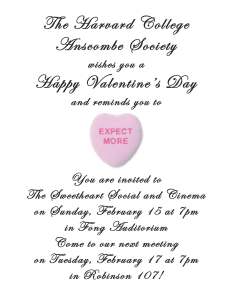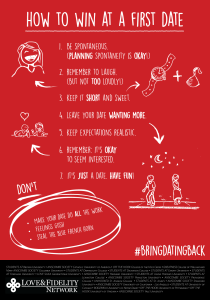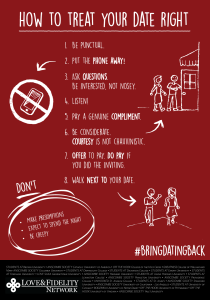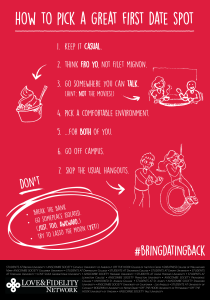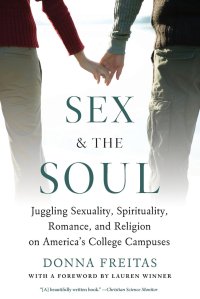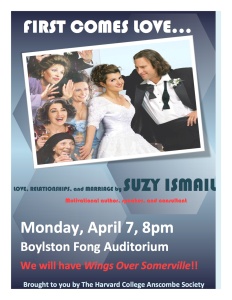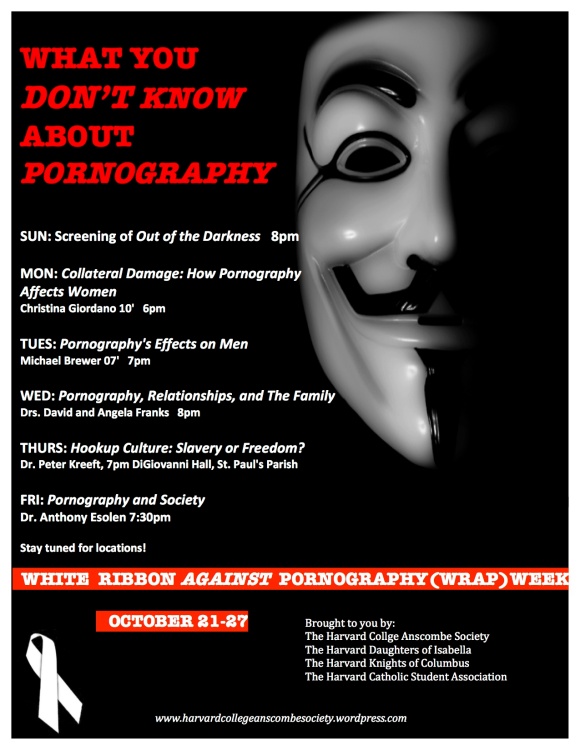The Harvard College Anscombe Society
Promoting Chastity and Sexual Ethics at Harvard
Author Archives: Luciana Milano
Dr. Donna Freitas at Harvard
Join the Harvard College Anscombe Society for a discussion with author, writer, lecturer and professor Dr. Donna Freitas about the current, national conversation about sexual assault on college campuses.Hookups have become the norm on campus, and while students will defend their right to individual hookups, living in the context of a culture of hooking up during college seems to make students (both men and women) unhappy. In this talk, Donna Freitas will discuss her research findings about sex, romance, dating, and hookup culture on campus, as well as her findings about how student interest in spirituality coincides with the growing dominance of hookup culture during the college and university experience. Don…na discusses these findings in light of gender and sexual orientation, focusing especially on the surprising things she learned about men’s attitudes regarding hookup culture.The talk will occur on Tuesday, February 3rd, at 7PM in the Fong Auditorium in Boylston Hall. Food will be served.
Donna Freitas is the author of both fiction and nonfiction works. Over the years, she has written for national newspapers and magazines, including The Wall Street Journal, The New York Times, and The Boston Globe. She received her Ph.D. in Religion from Catholic University, and she’s currently a non-resident research associate at the Center for the Study of Religion and Society at the University of Notre Dame. Donna has been a professor at Boston University in the Department of Religion and also at Hofstra University in their Honors College.
This event is hosted by the Harvard College Anscombe Society with the support of the Love and Fidelity Network and the Leadership Institute.
Coffee and Tea with Professor Stoner
The Harvard College Anscombe Society and
Harvard Right to Life cordially invite you to coffee and tea with
Professor James Stoner
Garwood Visiting Professor & Fellow at Princeton University Professor of Political Science, Louisiana State
4pm Monday, March 31st
location TBD
Discussing SOCIAL CONSERVATISM
Here are a few of his articles:
Social Conservatives Cannot Ignore Political Realities
http://www.thepublicdiscourse.com/2008/12/106/
Taking a New Look at Pornography
Elizabeth Anscombe on Contracaption and Chastity
The Anscombe Society and Harvard Right to Life invite you
to a dinner discussion on
ETHICS AND CONTRACEPTION
MONDAY, FEB. 24, 7-8pm
Spindell Room
We will be discussing the following article by Elizabeth Anscombe:
http://www.orthodoxytoday.org/articles/AnscombeChastity.php
Chastity: The Forgotten Virtue
by Marian Crowe, Register Correspondent
The Statistics
Mary Eberstadt, in Adam and Eve After the Pill, writes about how many in today’s society fail to make the connection between social ills and the failure to practice chastity.
The facts are startling: In 2006, the Guttmacher Institute reported that about 95% of the American public had sex before marriage. Now, 40% of births in the United States are to unwed mothers (while it was just 4% in 1940).
The research in the social sciences increasingly shows how destructive sexual permissiveness has been. According to Premarital Sex in America: How Young Americans Meet, Mate and Think About Marrying by sociologists Mark Regnerus and Jeremy Uecker, sexually active young adults often feel “guilt, regret, temporary self-loathing, rumination, diminished self-esteem, a sense of having used someone else or been used, a sense of having let yourself down, discomfort about having to lie or conceal sex from family, anxiety over the depth and course of the relationship, and concern over the place or role of sex in the relationship.”
The authors also note that girls who were sexually active “were about 11 times more likely than virgins to report elevated depression symptoms.” Virgins, on the other hand, “tend to be a self-confident and accomplished lot.”
If young women suffer more from the sense of having given themselves away, pornography and casual sex harm young men by creating a kind of insatiable desire for more sex and a wider variety of sexual experiences.
In his recent book Lost in Transition: The Dark Side of Emerging Adulthood, University of Notre Dame sociologist Christian Smith argues that, for many young people, especially women, “sexual freedom is accompanied by real hurt, confusion, grief, anger and regrets.”
Chastity on Campus
In light of the devastating statistics, young voices are being raised in defense of chastity.
Young people see the harmful effects of casual, uncommitted sex both for themselves and for the larger society.
The Anscombe Society (Blogs.Princeton.edu/anscombe), named for the British philosopher and Catholic convert Elizabeth Anscombe, began at Princeton University in 2005. The society’s mission is to promote traditional marriage and family life, along with chastity.
In 2006, Harvard students founded True Love Revolution because they believed that “casual, liberationist sentiments toward sex, sexuality and relationships are detrimental to the health and well-being of our fellow students.” The group, now renamed the Harvard College Anscombe Society (HarvardCollegeAnscombeSociety.wordpress.com ),”strives to present another option to our peers regarding sex-related issues, endorsing premarital abstinence and sexual integrity, upholding the institution of marriage and the family and advocating true feminism.”
In 2007, one of the founders of the Anscombe Society felt there was a need for a national organization to give college students more resources to resist the pressure to conform to the norm of casual sex on campus. The result was the Love and Fidelity Network (LoveandFidelity.org).
Caitlin Seery, a spokeswoman for the organization, gave the Register insight into the situation on contemporary campuses: “It’s widely understood that sexual integrity is under assault on college campuses when it comes to the social aspects of campus life, through the hook-up culture and gross misunderstandings of healthy dating norms. But what people don’t know is that university administrations, under the pretense of providing sexual education, often perpetuate (if not worsen) the problem, both by setting the tone in their programming for what is considered normal — lots of casual sex — and providing one-sided support for events like ‘Sex Week,’ where pornography screenings are the tip of the iceberg.”
There is hope, she said. “Fortunately, the other piece that people don’t know is that there is a national movement of students pushing back: of courageous young leaders challenging their peers to embrace a healthier understating of sex and challenging the administrations to take seriously the academic arguments and research in favor of sexual integrity. These young leaders and the ideas they are exposing their peers to are reshaping the campus conversation about sex — and will ultimately reshape the campus sexual culture, too.”
Seery also pointed out how the campus culture affects the larger society. “The ideas of the sexual revolution — which have fueled the breakdown of marriage and family in our culture — found a foothold in America’s colleges and universities; and from there, influenced the ideas and behavioral norms that have come to shape American society and culture,” she said. “In order to reverse these trends and restore a proper respect for marriage, the family and the integrity of sex, we must similarly focus on America’s educational institutions with the goal of challenging the reigning sexual orthodoxy and changing the mode of discourse on these topics and the behavioral norms surrounding them.”
The Love and Fidelity Network is meeting this challenge. “At the Love and Fidelity Network, our aim is to raise up a generation of leaders who will challenge the ideology of the sexual revolution. Our mission is to educate students in the arguments defending marriage, family and sexual integrity and to equip them with the leadership skills and materials they need to effectively articulate their beliefs and commitments on campus and in the public square,” Seery said. “Our network is a truly unique collection of renowned scholars, culture leaders and talented young college men and women. We personally coach and mentor these young leaders in their efforts to challenge the sexual orthodoxy on campus and to form them with the ideas and knowledge they need to carry the truth about marriage forward to the next generation.”
There are now more than 20 universities with student groups promoting chastity on campus, Including Stanford, the University of Virginia and Columbia.
Yet, even on religious campuses, there is pressure to conform to the hook-up culture, suggesting that these schools, in spite of their religious affiliation, are not providing their students with adequate grounding in their faith’s sexual morality and a support system to help them live by it — despite these schools having student groups that promote chastity.
Three young women at the University of Notre Dame, who did not want their last names used, offered their perspectives to the Register. Sheridan thinks that “living chastely on college campuses becomes easier once you realize that ‘doing it because everyone’s doing it’ is no longer a valid excuse.” As Clarissa says, “When women demand respect from a man, the men worthy of attention rise to the occasion.” Jessica believes that chastity should not just be presented in a negative manner, as a list of prohibitions, as is often the case in our society. “Personally, I see chastity as something illuminating and beautiful, something that informs my entire worldview,” she says. “I think we need to start talking about the glorious beauty of chastity more.”
Chastity Online
Young people’s enthusiasm for chastity is not limited to college campuses. They are also promoting chastity online. In the summer of 2010, Patrick Langrell, director of young-adult outreach for the Archdiocese of New York, launched Love and Responsibility, which sponsors small-discussion groups on the subject of authentic love and relationships and promotes the ideas presented in Pope John Paul II’s theology of the body. The organization’s website (LoveandResponsibility.org) has videos of talks on sexuality and marriage preparation, as well as information on activities in the New York area and links to related topics.
The Chastity Project (ChastityProject.com) features young married couple Jason and Crystalina Evert, who have talked about chastity to more than a million people on five continents and authored books, CDs and DVDs. The site has Facebook and Twitter pages.
Also on the site is Sarah Swafford (see related profile in this section), who stresses the importance of what she calls “emotional virtue” in combating the sexual revolution and keeping one’s emotions under control. “It seems as though the world is constantly bombarding and manipulating the emotions and passions of men and women — sometimes without their even realizing it,” she told the Register. “What we let invade our hearts and minds can take root and ‘mess with us.’ We have to fight it with virtue.”
True Love
What is animating so many of these young people is that they clearly see the connection of chastity with the love that we all want, a connection so eloquently expressed by wife, mother and law professor Helen Alvaré in her book Catholic Women Speak for Themselves:
“Women looking for happiness and freedom are searching for ways to live that might genuinely deserve the name ‘loving.’ But we live in a world that has regularly adulterated the meaning of the word: loving as taking care of No. 1; loving as sexual license; loving as doing what is emotionally satisfying; loving as never judging; and loving as avoiding suffering. We are, rather, looking for love that will bring genuine goodness, wholeness, happiness and a spirit of generosity — in a word, love in truth. Love that actually allows us to be the person God meant us to be, and loving that reflects the way we would want to be loved ourselves, the way God loves us.”
The work of Alvaré, Regnerus and Eberstadt and the commitment of organizations like the Anscombe Society and the Chastity Project are decisively engaging and attempting to undo the societal damage caused by sexual promiscuity.
And it is affecting the many young people who passionately believe in the connection between sexual morality and human flourishing. For them, chastity is beautiful. They are attractive, articulate, self-confident and joyful.
Chastity is making a comeback.
This article was originally published here: http://www.ncregister.com/site/article/chastity-the-forgotten-virtue/?utm_source=feedburner&utm_medium=feed&utm_campaign=Feed%3A+NCRegisterPrintEdition+National+Catholic+Register+Print+Edition
Why Knot Now?
Unless marriage is politicized, many people my age do not take it seriously. Many of my classmates do not date and see marriage only as rite of passage for the future—way far out in the future. I recently heard a presentation on this topic by Dr. Jason Carroll of Brigham Young University at the Love and Fidelity Network’s National Conference. He said many people talk about the who, thewhat, and the why of marriage, but there has been little analysis of thewhen. In other words, when is a good age to get married? The national average in which women (27) and men (29) marry has been on the rise, but what does this mean?
His presentation called “Knot Yet: The Benefits and Costs of Delayed Marriage” analyzed the implications of this trend across men and women of various socioeconomic levels. His main findings suggest that delaying marriage financially benefits the upper class but creates challenges for those who have less than a college degree. The fact that “marriage has shifted from being the cornerstone to the capstone of adult life” has not only made marriage seem unattainable to many, but has also altered one of the primary reasons get married—to start a family. Carroll’s report found that today, “for women as a whole, the median age at first birth (25.7) falls below the median age of first marriage (26.5).” This crossover in the trends of marriage and childbearing has had particularly negative consequences for people of lower income brackets.
Obviously economic success or stability is not the end of marriage, but if it’s a reason people are delaying marriage, the research suggests that people shouldn’t be afraid to get married sooner rather than later. Carroll found that a married couple’s level of education most positively influences their financial prospects not the age at which the couple gets married. In light of the capstone mentality of marriage, this is an important finding. Although the research also shows that getting married really young (late teens early twenties) increases likelihood divorced, these premature marriages are quite rare today.
As college students, marriage is not only something we should begin to think seriously about, but also something we should act seriously about. How can we expect to have healthy and happy marriages when we keep putting marriage off to satisfy our personal pleasures and ambitions? How do we expect marriage, a lifelong commitment, to work when we aspire to cohabit instead? Many of us want to share the rest of our lives with someone else but are making choices that are not preparing us for commitment and total-self-giving love.
I know that marriage and having children is an uncomfortable topic for many people my age. At a place like Harvard, getting married shortly after college is stigmatized. But this shouldn’t be the case. Getting married doesn’t mean giving up your life or ambitions. It means starting a new life, sharing your ambitions, and growing with another person. If getting married is something we want, even if we can’t fully determine when, we shouldn’t continue the upward trend of knot yet.
Luciana E. Milano ’14 is a government concentrator living in Pforzheimer House. She is President of The Harvard College Anscombe Society.
This article was originally posted in the Love and Fidelity Network State of Affairs, You can read the whole article here: http://www.loveandfidelity.org/2013/11/27/why-knot-now/
WRAP Week updates
|
REMAINING EVENTS ARE LISTED BELOW Harvard WRAP is Co-Sponsored by: WEDNESDAY AT 8:00 P.M. — Emerson 305 THURSDAY AT 7:00 P.M. — DiGiovanni Hall, St. Paul Parish FRIDAY AT 7:00 P.M. — Sever 113 |

